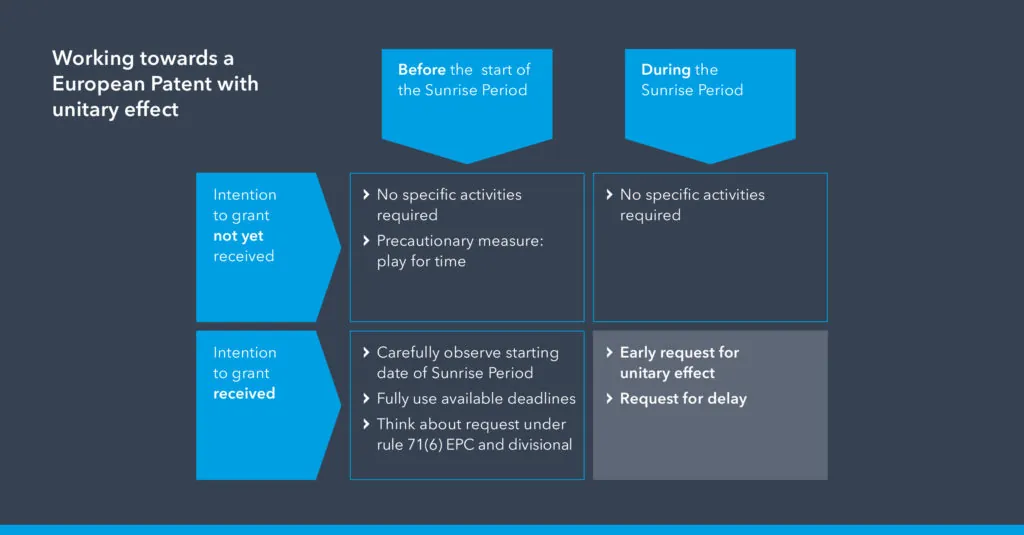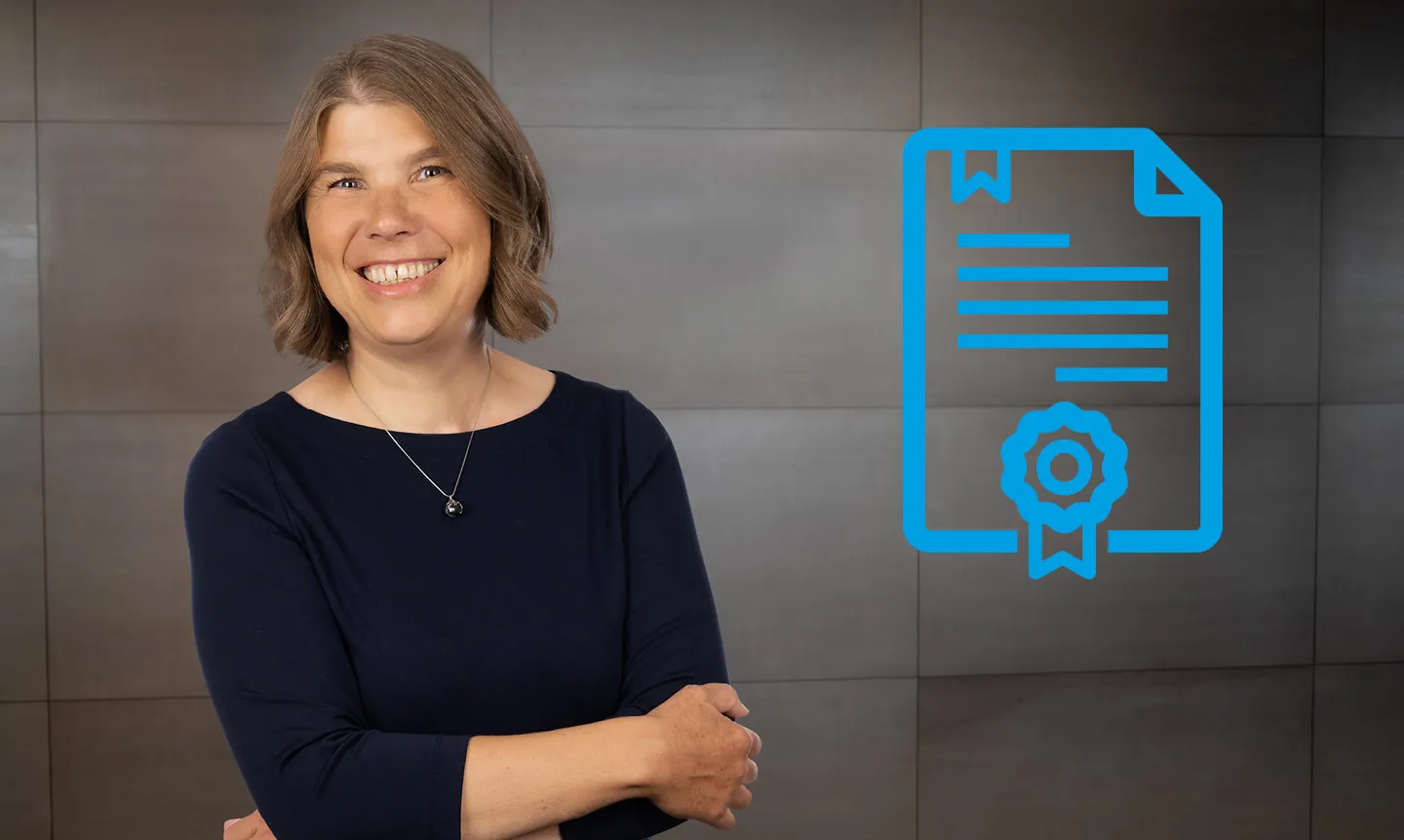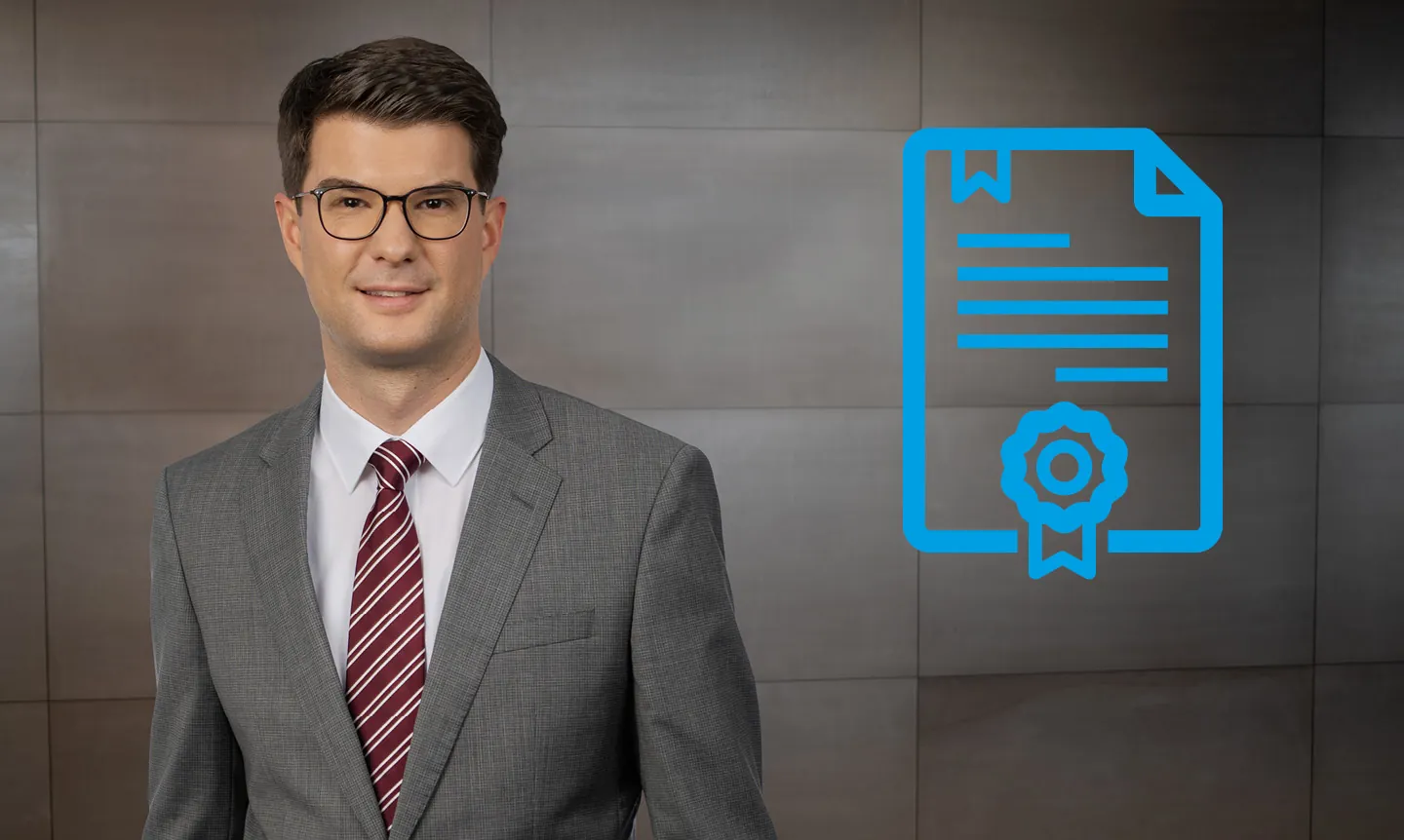





























The Unified Patent Court commenced operations on June 1, 2023.
The new Unified Patent Court deals with infringement or nullity for all participating EU member states together. Thus, the Unified Patent Court has joined the already existing national courts which deal with infringement and invalidity only for the respective country.
The Unitary Patent is an EP patent with unitary effect in all participating EU member states. This means that infringement and invalidity of a unitary patent are dealt with jointly at the Unified Patent Court for all participating member states.
The filing and grant procedure of a conventional EP patent application remains as it was. To obtain a unitary patent, a request for unitary effect must be filed within one month of the mention of the grant of the EP patent. This then results in combined protection from a unitary patent in the available countries and the conventional national parts of the EP patent in the other countries.
This means that for the states marked below in blue, only an EP patent will be available, while for the currently participating EU member states, marked in green, there will be a choice between a Unitary Patent or an EP patent.
The applicant must decide whether to have an EP application automatically granted as an EP Patent or whether a request for unitary effect to obtain a Unitary Patent in the available states (green).
The UP cost simulator allows you to compare the development of the maintenance costs of a granted European Patent based on validation strategies involving the Unitary Patent or not, based on current annuity fees. Patent characteristics, planned lifetime and territorial coverage are taken into account and may be adjusted individually. Please note that the territorial scope of the UP may change over time, as well as official fees (taxes) and accordingly may vary from that provided in the Unitary Patent Simulator. The information provided by the simulator is thus only for providing a rough overview and it is recommended to seek for professional advice. Please consult our experts at upc@maiwald-test.dev5.yoyaba.tech for any questions, or your Maiwald attorney. Maiwald will provide you with independent professional advice to find the best solution meeting you individual needs.
The Unified Patent Court will handle infringement or revocation for all participating EU member states at once. The Unified Patent Court will work alongside the present national courts, which currently handle infringement and revocation only for their respective state.
The applicant will have to make a decision regarding whether the Unified Patent Court will be automatically competent for all their pending EP patent applications or whether an Opt out request will be filed, so that the national courts remain competent for infringement and revocation in each state.
This decision can again be based on the different factors:
What is the UPCLA network?
The UPCLA network, created in 2014, is a non-exclusive network of European lawyers and patent attorneys firms, all recognized for the excellence of their intellectual property practice by international rankings. The purpose of the UPCLA network is to plan and coordinate panEuropean patent litigation (as well as in the whole field of intellectual property in general), pending the advent of the Unified Patent Jurisdiction.
What are the reasons to choose the UPCLA network?
Proficiency
The UPCLA is a European network gathering:
Simplicity & Flexibility
A single point of contact:
Independence
All members are independent:
Inside knowledge
Find out more on the UPCLA network: upcla
Maiwald UPC videos is a comprehensive series of videos dedicated to the Unitary Patent and the Unified Patent Court, providing you with insights on how to prepare for the new patent and the new court system. We will also provide you with strategies and roadmaps when being faced with the decisions whether a Unitary Patent or a classic EP patent may be the best option and whether the Unified Patent Court or an opt out to the national courts may be the best option.
In this video Dr-Ing. Sophie Ertl (Partner at Maiwald) gives you an overview on the new system and some guidelines on how to decide between the different options.
To the video
In this video Dr Tobias Philipp (Patent Attorney at Maiwald) discusses translation requirements, the early request for unitary effect and the request for delay in issuing the decision to grant a European patent.
To the Video
In this video Heike Röder-Hitschke (Counsel at Maiwald) will make you more familiar with the unitary patent court, its organizational structure, jurisdiction and procedures, summarizing the basic information in order to prepare you for the next step – the decision to opt out or to stay in and make use of the new court system.
To the Video
Dr Ulrike Herr (Partner at Maiwald) explains the meaning of opting-out. Specifically, the focus is on effects and limitations of opting-out, as well as on opting-out strategies. The video will also provide a to-do-list to start with preparations for opting out.
To the video


It has been agreed upon for several weeks and was already confirmed at the meeting of the Administrative Committee of the Unified Patent Court (UPC)
Continue reading

What is the UPCLA network? The UPCLA network, created in 2014, is a non-exclusive network of European law...
Continue reading

In all probability, the Unitary Patent System will kick off on 1 June 2023. Applicants of European patents which will be granted on or after that date, thus, have two options....
Continue reading

Last week it was announced that the planned start of the Unitary Patent System will be postponed to June 1, 2023. Accordingly, the start of the Sunrise Period is scheduled for...
Continue reading

Recently, fundamental doubts have increased considerably as to whether the timetable for the entry into force of the Agreement on a Unified Patent Court (UPCA) presented on 6 ...
Continue reading

On 6 October 2022, the Preparatory team for the Unified Patent Court...
Continue reading

The Protocol on the Provisional Application of the UPCA entered into force on 19 January 2022 and the Unified Patent Court (UPC) was born as an international organisation. At ...
Continue reading

In 2022, a new court system and a new patent will begin The new Unified Patent Court wil...
Continue reading

In view of the forthcoming introduction of the Unitary Patent, the European Patent Office (EPO) has now declared that it will allow requesting a delayed grant and early reques...
Continue reading

On January 18th, Austria has deposited its instrument of ratification on the Protocol to the Agreement on a Unified Patent Court on provisional application as the thirteenth m...
Continue reading

As announced by a court spokesperson of the Federal Constitutional Court on 13 January 2021, the Federal Constitutional Court has asked the Federal President of Germany to pos...
Continue reading

Yesterday, Thursday 26 November 2020, the German Parliament (Bundestag) adopted the draft ratification bill on the consent to the Agreement on a Unified Patent Court at its 19...
Continue reading

Today, the German Federal Constitutional Court (FCC) published its decision regarding a constitutional complaint regarding the Unified Patent Court (UPC). The Court ruled that...
Continue reading
The decision can be based on how the patents would be effected: For the Unitary Patent, infringement or revocation will be decided for all states at once at the Unified Patent Court. For example, a positive infringement decision with a unitary effect in all states can be a great win for the applicant, while a revocation decision with a unitary effect in all states would be a great loss for the applicant, the patent would be lost in all states at once. The applicant might choose the Unitary Patent only for very strong patents.
The decision between EP patent and Unitary Patent can also be based on the different annuity costs.
The Unified Patent Court commenced operations on June 1, 2023.
The time has come to prepare your EP patent portfolio for the Unitary Patent and the Unified Patent Court!
The Unitary Patent will be a European patent with unitary effect in all participating (contracting) EU member states (CMS). At present, the Unitary Patent will cover the following 17 CMS that are also member states of the European Patent Convention (EPC) (EPC member states): Austria, Belgium, Bulgaria, Denmark, Estonia, Finland, France,
Germany, Italy, Latvia, Lithuania, Luxembourg, Malta, the Netherlands, Portugal, Slovenia, Sweden.
In practice, the Unitary Patent will be a European patent that has been converted into a Unitary Patent. Unitary effect means that infringement and revocation will be handled for all CMS before the Unified Patent Court. A Unitary Patent can only be maintained or revoked for all CMS at the same time.
Three transitional measures will already be available during the Sunrise Period, in some cases ((1) and (2)) as soon as Germany deposits its instrument of ratification:
24 EU member states have signed the UPCA. To be covered by the Unitary Patent, an EU member state must have signed and ratified the UPCA when the unitary effect is registered.
17 EU member states have already signed and ratified the UPCA (the contracting EU member states – CMS).
When the new system starts, said 17 CMS (which are also EPC member states) will be covered by the Unitary Patent:
Austria, Belgium, Bulgaria, Denmark, Estonia, Finland, France, Germany, Italy, Latvia, Lithuania, Luxembourg, Malta, Netherlands, Portugal, Slovenia, Sweden.
Importantly, the geographical scope of a Unitary Patent will remain the same for its lifetime and will not be extended to any EU member states who ratify the UPCA after registration of the patent’s unitary effect.
The EPC has 39 member states. Currently, the Unitary Patent is not available for 22 EPC member states. For these 22 member states, only conventional European patents (bundle patents) are available.
12 EPC member states are not EU member states: Albania, Iceland, Switzerland, Liechtenstein, North Macedonia, Monaco, Montenegro, Norway, San Marino, Serbia, Turkey, and the UK. For these EPC member states a Unitary Patent is not available and will not be available in the future.
3 EPC member states are also EU member states but not participate in the UPC system: Croatia, Poland, and Spain. For these EPC member states a Unitary Patent is not available; however, they can sign the UPCA any time.
7 EPC member states are also EU member states and have already signed, but not yet ratified the UPCA: Cyprus, Czech Republic, Greece, Hungary, Ireland, Romania, and Slovakia. For these EPC member states a Unitary Patent may be available in the future.
Conventional European patents (bundle patents) granted by the EPO will still cover the above-mentioned EPC member states. However, for these EPC member states, the conventional European patent needs to be validated, maintained, and enforced before National Courts as now.
Costs before grant: The costs for filing and prosecuting a European patent application will remain the same. There is no official fee for a request to delay the grant of a European patent, an early request for a unitary effect, or the request for a Unitary Patent.
Translation fees: During a transitional period of at least 6 years, a translation of the whole patent specification is required. If the language of the patent is English, a full translation of the specification into any other official language of the EU is required. If the language of the patent is German or French, a full translation of the specification into English is needed. Please note that the “translation fees” transitional period is at least 6 years, whereas the “opt-out” transitional period is 7 years (see below).
Renewal fees after grant: The renewal fee for maintaining a Unitary Patent approximately equals the sum of the renewal fees of the four largest EPC member states (DE, FR, GB, NL). The total cost of renewal fees over the first ten years, which is the average lifetime of a European patent, will be less than 5,000 EUR.
| Pro Unitary Patent | Con Unitary Patent |
| One step to register unitary effect at the EPO without official fee. | It can only be maintained or revoked for all CMS. |
| No more national validations, i.e., no parallel multiple translations and multiple payment of annuities necessary. | |
| Potentially reduced translation cost after transitional period. | Potentially higher translation costs during transitional period since the European patent is normally only validated in London Agreement countries. |
| Lower renewal fees if the European patent shall be validated in four or more EU member states. | Higher renewal fees if the European patent shall be validated in three or less countries. |
| Covers at least the 17 CMS. | Does not cover all EPC member
states – for countries that are not part of the UPC system, the European patent needs to be validated as has previously been the case. |
| The Unitary Patent falls within the competence of the UPC and allows enforcement in one single action in currently 17 CMS. | The Unitary Patent cannot be opted-out from the UPC and can be invalidated in one single action for currently 17 CMS. |
After the start of the UPC System, Unitary Patents will automatically fall within the competence of the UPC. Further, conventional European patents and SPCs
(Supplementary Protection Certificates) will also fall within the competence of the UPC, unless the patentee opts-out the conventional European patent and/or SPC. Opt-out means that the conventional European patent/SPC is removed from the UPC’s competence for its lifetime and the national courts remain competent. For Unitary Patents, an opt-out is not possible.
An opt-out is only possible once and can be filed at any time from the start of the Sunrise Period until one month before expiry of a transitional period of at least 7 years.
An opt-out can no longer be requested once an action is pending before the UPC. The opt-out request needs to be filed for all EPC member states of a conventional European patent.
An opt-out request must be filed in the name of all patentees. It may be withdrawn once.
The opt-out request needs to be filed with the UPC registry in Luxembourg.
Effective date of the opt-out is the entry into the register of the UPC.
| Opting out | Using the UPC |
| Patentee: Removes economically important patents from the UPC | Patentee: Test the UPC with less important patents |
| Patentee: Prevents revocation of a European patent in one single action in currently 17 CMS even after expiry of EPO opposition period | Patentee: Enforcement of a European patent in one single action in currently 17 CMS |
| Patentee: Lower litigation cost if litigation only planned in one or two EU Member states | Patentee: Lower litigation cost versus separate litigation in three or more EU Member states |
| Patentee: Delays revocation of a European patent | Patentee: Speeds up enforcement of strong patents |
| Patentee/Infringer: Known and predictable case law of National Courts | Patentee: Higher values of the case and higher recoverable costs |
It is important to start preparations now:
Legal texts
Here you will find legal principles, legal texts and binding forms in English and (where available) in German.
Unified Patent Court
Protocol to the Agreement on a Unified Patent Court on provisional application
Unitary Patent
Here you will find the information issued by the EPO on the unitary patent.
Unified Patent Court
Here you will find essential information on the UPC as well as information on opting out.
UPC website: www.unified-patent-court.org
EPO website: Unified Patent Court
Feel free to contact our UPC taskforce if you have any questions on the Unitary Patent System: upc@Maiwald.eu








